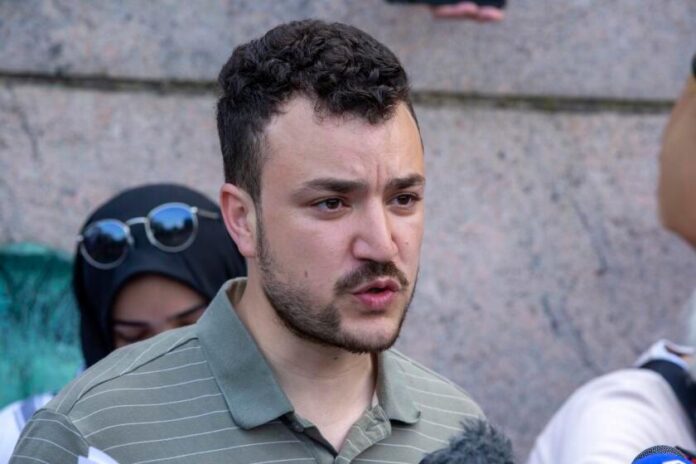
Key Insights:
- Hamas supporter, Mahmoud Khalil’s activism raises crucial questions about the rights and responsibilities of noncitizens on American soil.
- Deportation laws firmly uphold U.S. sovereignty and national security against threats posed by individuals supporting terrorism.
- Politicized protests defending Khalil highlight deep ideological divisions threatening American societal cohesion.
By Samuel A. Lopez – USA Herald
The past weeks have seen national media attention oddly diverted from pressing economic and geopolitical matters toward the contentious case of Mahmoud Khalil, a former Columbia University graduate student facing deportation. The Syrian national and Algerian citizen has become an unlikely figurehead, igniting fervent debate over immigration law, free speech, and national security. Yet, as compelling as these discussions may be, the legality and necessity of Khalil’s potential deportation are clear-cut.
Mahmoud Khalil became widely recognized last year as the “public face” of pro-Hamas protests at Columbia University, notoriously representing the group Columbia University Apartheid Divest (CUAD). This organization infamously celebrated Hamas’ brutal attacks on Israel in October 2023 as a “moral, military, and political victory,”advocating openly for the destruction of Western civilization itself.
In the United States, the privilege granted to foreign nationals to remain on American soil rests upon the consent of the sovereign—“We the People.” When that consent is violated, as in Khalil’s case, deportation becomes not merely permissible but imperative. Historical and legal precedents clearly articulate this sovereign right. Emer de Vattel’s influential 1758 treatise, “The Law of Nations,” affirms the absolute right of any nation to exclude or remove foreign nationals deemed harmful to its security or interests. Reinforcing this notion, the late Supreme Court Justice Antonin Scalia underscored in a 2001 dissent, “Due process does not invest any alien with a right to enter the United States, nor confer on those admitted the right to remain against the national will.”
As a legal analyst with over two decades of experience in this field, it’s clear to me that Khalil’s deportation aligns squarely with U.S. sovereignty principles. When a noncitizen—whether here on a tourist visa or green card—violates the conditions underpinning their residency, the U.S. retains unequivocal authority to withdraw its consent for their continued presence.
Indeed, Khalil’s involvement as the chief negotiator for Columbia University Apartheid Divest places him squarely at the intersection of three troubling anti-Western currents: the radical progressive movement, violent ideological extremism, and a globalist push to dissolve national sovereignty distinctions altogether. His supporters, many entrenched in woke activism or driven by utopian dreams of a borderless world reminiscent of John Lennon’s “Imagine,” fail to acknowledge the fundamental necessity of sovereign nations safeguarding their integrity.
This case is not merely about Khalil, but rather about upholding the integrity and sovereignty of a nation. The power to exclude, to draw boundaries, and to enforce conditions upon those seeking entry is foundational to a country’s self-preservation. Without the ability to deport individuals who threaten its core values, the United States risks losing the very sovereignty that enables it to govern and protect its citizens.
Those protesting Khalil’s detention and possible deportation argue about free speech and global citizenship, but in doing so, they dangerously blur the line between the rights afforded to citizens versus noncitizens. The freedoms granted to visa holders and permanent residents do not immunize noncitizens from consequences should they endorse or participate in organizations promoting violence or hatred against the nation hosting them.
Critics argue that Khalil’s deportation infringes on principles of free speech and dissent. However, freedom of expression does not guarantee immunity from immigration consequences when such expressions include supporting terrorist groups or celebrating violence. The U.S. has historically prioritized public safety and national security in immigration matters, establishing precedents for deportation in similar cases.
Thus, the narrative framing Khalil as a victim of unjust persecution misrepresents the reality: he is a foreign national whose presence has become incompatible with national interests and security. The conflation of legitimate immigration discourse with the advocacy of violence is perilous, undermining meaningful debate about immigration policy and security.
Ultimately, Mahmoud Khalil’s case underscores the critical necessity of clear boundaries within immigration law. His potential deportation is not only lawful but imperative, serving as a strong statement of national resolve and sovereignty. It is a reminder that while America remains welcoming to those who uphold its values and laws, it retains the essential right—and duty—to act decisively against those who pose threats.


